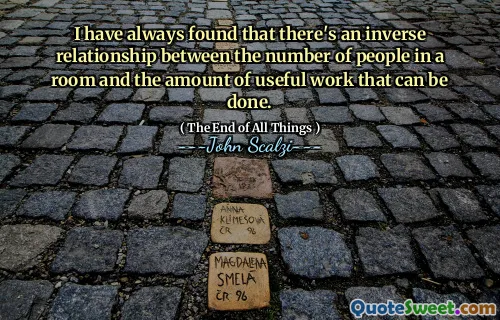{I}t was designed to operate with minimal assistance from humans, who were without exception the moving part most likely to fail.
In "The End of All Things" by John Scalzi, the author explores the theme of human error in systems designed for minimal human intervention. He suggests that the limitations of human involvement are significant, as people are often the weakest links in operational processes. This perspective reflects a growing reliance on technology to function efficiently and securely without the need for constant human oversight.
Scalzi's narrative indicates a future where machinery and automation take precedence over human input, highlighting the inherent flaws in human nature that can lead to failures. By minimizing human interaction, these systems aim to achieve greater reliability and effectiveness, presenting a thought-provoking commentary on the role of humanity in an increasingly automated world.


